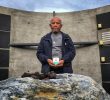The International Federation of Journalists (IFJ) calls on Fiji’s interim military government to put an immediate stop to efforts to shut down the country’s independent media, following a call by a senior army officer for the closure of the Fiji Times.
According to local media reports, the Land Force Commander of Fiji’s Military Forces, Colonel Pita Driti, issued a media statement on March 25 attacking the Fiji Times, saying it was �the most non-cooperative and biased newspaper in the country�. He alleged that the media did not give adequate coverage to military �grievances� or �positive achievements�.
The newspaper’s editor, Netani Rika, said Driti’s comments were unfortunate. He said the Fiji Times sought to give fair coverage on all issues and incidents involving the Army and interim administration, and he invited Driti to be more specific about his complaints.
The IFJ is extremely concerned for the safety and integrity of Fiji’s media, and urges the interim military government to instruct all officials and senior military personnel to refrain from making or endorsing statements that demand censorship and serve to incite anti-media sentiment.
�Colonel Pita Driti’s public call for a newspaper to be shut down because he apparently does not agree with its content demonstrates a gross misunderstanding of the role of independent media in an open society,� IFJ Asia-Pacific Director Jacqueline Park said.
�This kind of comment by a high-ranking military officer appears intended to intimidate the media community, and is irresponsible given recent physical attacks on media personnel.
�The IFJ urges Fiji’s interim military leaders to make a public commitment to the protection of media personnel and freedom of expression in Fiji.�
Driti’s statement comes after more than a year of systematic anti-media actions by the interim military government of Commodore Frank Bainimarama. In particular, there has been a campaign to intimidate and undermine the Fiji Times, with the deportation of one publisher last May and another in January, the newspaper’s conviction on contempt charges for publishing a letter critical of a court ruling upholding the legality of Fiji’s 2006 military coup, and police searches of the paper’s offices and questioning of the editor earlier this month.
It also follows a firebomb attack by unknown assailants on Rika’s home on March 23, in which bottles filled with kerosene and sugar failed to ignite, and the smashing of Rika’s car on March 10.
In his statement, Driti also expressed dissatisfaction with the Fiji Media Council and its advice to political parties and stakeholders on dealing with complaints about the media.
The IFJ reiterates that complaints against the media must be dealt with through an open dialogue and independent regulatory mechanisms. Shutting down media, deporting publishers and seeking court convictions only take Fiji further along the path toward a closed society.
For reference:
IFJ Asia-Pacific – +612 9333 0919
The IFJ represents over 600,000 journalists in 120 countries worldwide










